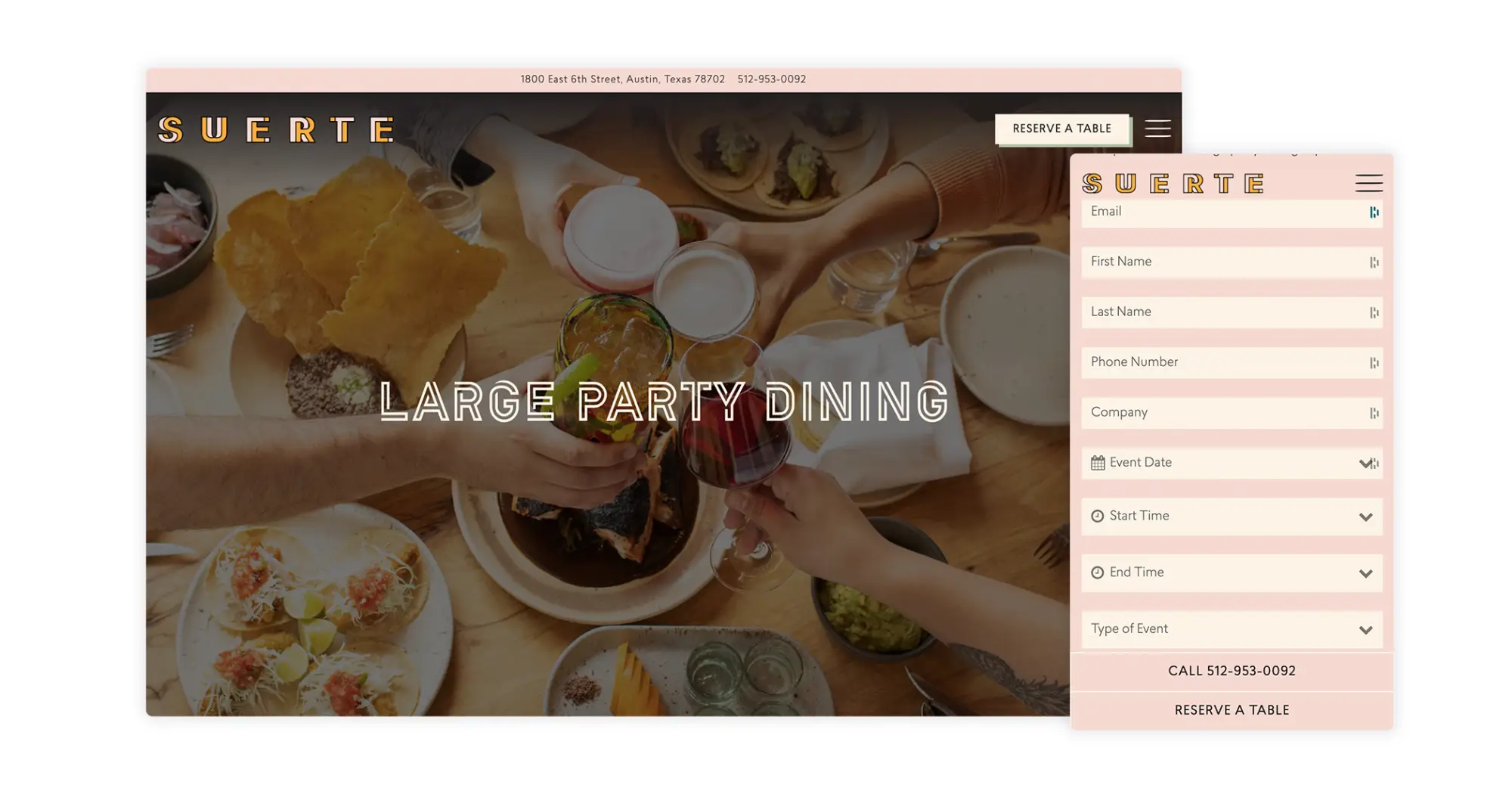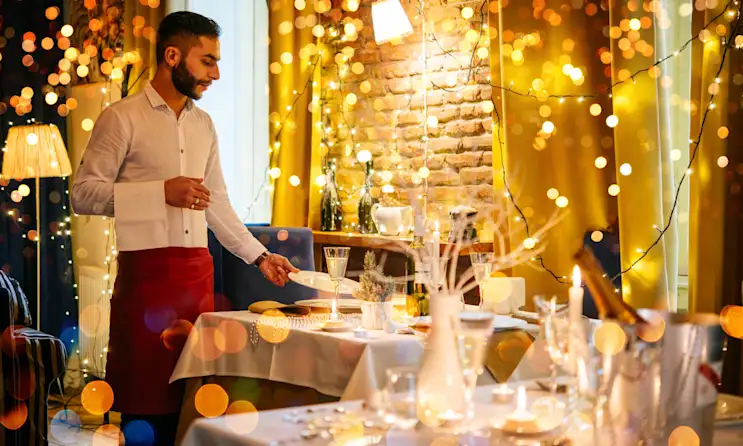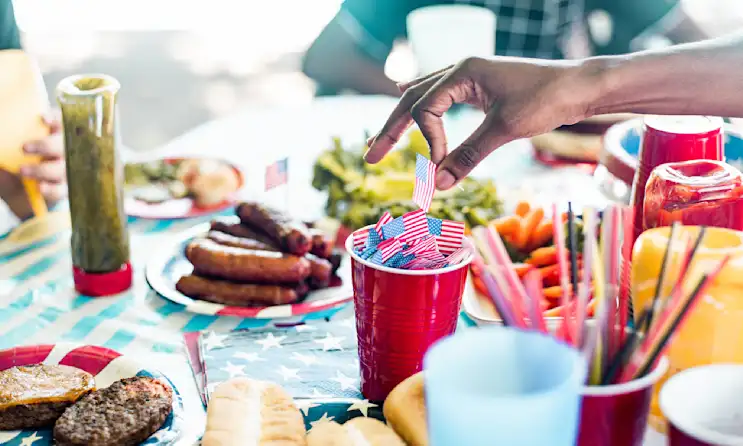Holidays
How To Prepare for Restaurant Holiday Events
How to wow your guests with thoughtful, festive details during the holiday season.
Office outings, family gatherings, holiday parties and other festivities are just around the corner. For restaurants, this time of year means some serious heads-down work to ensure these events go off without a hitch. Between staffing for events, ordering and preparing the right amount of food and adhering to local safety protocols, restaurateurs have their work cut out for them this holiday season.
But all of this work pays clear dividends to the business. In the short term, restaurants benefit from extra revenue from room rentals and higher markups on prix fixe menus. In the long term, a restaurant that cements its position as the go-to option for a holiday event can book up quickly year after year, meaning more diners around major holidays — as well as the chance to create repeat customers throughout the year.
In order to get there, restaurants need to perfect their ability to plan, promote and put on joyous holiday events.

PRODUCT
Events Management Software
Streamline private event bookings for you and your guests.
Types of Restaurant Holiday Events
Before jumping into planning and promotion, it’s worth considering which holiday events and services a restaurant should offer. Specifically, restaurants should analyze what different event types entail, their pros, their cons and any special considerations for them.
1. Off-Site Catered Events
Restaurants can cater holiday events by preparing and selling a large amount of food at off-premises gatherings. These requests can be fielded in many ways, but online platforms that facilitate catering pre-orders have become valuable for managing operations.
Pros
Profitable: Catering has an average profit margin of 7-12%, while the average restaurant’s profit margin is between 4-7%.
Efficient: When providing self-service catering, restaurants can generate high revenue without having to hire additional staff to serve the event. Basically, off-site catering equates to a giant takeout order.
Cons
Missed Branding Opportunities: It’s easy for guests at an off-site event to look at catered food as a delicious meal from an unknown restaurant, meaning restaurants might not get the credit or newfound customers they deserve.
Relinquished Control: Off-site catering — particularly when not staffed — is largely outside of the restaurant’s control. If there’s an issue with the food at a catered event, an employee may not be there to swiftly address it like they would in a restaurant.
Food Freshness: Extra consideration needs to go into preserving a food’s integrity and temperature when being delivered and served en masse.
Special Considerations
Food Delivery: Will the restaurant deliver the food or will patrons need to pick it up themselves? If the former, will employees be responsible for setup and breakdown?
Foodservice: Will catered events have an option for full-service from the restaurant?
Supplies: What equipment is needed for off-site catering? Requirements could range from larger-sized food containers to serving utensils to tables to a catering truck.
2. Restaurant Space Rentals
Many guests want the option to rent out space in their favorite restaurant, making space rentals a popular and profitable option for corporate holiday parties and large family get-togethers. For some, this means renting out the entire venue; for others, a sectioned-off area of the dining room will do just fine. Restaurants demonstrate how to offer different space and menu options for these buyouts, depending on guest requirements.
Pros
Guaranteed Revenue: Whether it’s partial or full, revenue is assured when space is rented out. That’s why, whenever possible, rentals should be held during slower shifts and require food purchase minimums.
Streamlined Kitchen Operations: Space rentals often come with a prix fixe menu or even a catered approach, making it easier for back-of-house employees to prepare food faster.
Cons
Spatial Requirements: Some restaurants simply don’t have the square footage or floor designs to accommodate space rentals.
Lost Revenue: Dedicating space to a rental means fewer guests can be served — and if the space is fully booked, walk-in guests can’t be fed. For this reason, it’s worth setting price or headcount minimums for space rentals or only hosting them during select days and hours.
Special Considerations
Setting Minimums: Will the space rental require a minimum number of hours, guests or food/beverage purchases?
Event Layout and Logistics: What changes will be made to the restaurant’s layout to accommodate these rentals? How will guests be given privacy? How long will setup/breakdown take?
3. Private Dining
Like a partial space rental, private dining entails guests eating in a reserved section of the restaurant. Unlike a partial space rental, this option tends to be in its own reserved room and appeals to a smaller group that wants a more private, intimate setting. These rooms can vary in size and setup, which impacts how much guests will be willing to pay to use one.
Pros
Repurposable Space: When rooms are not being rented, they can be altered to be used as a normal section of the restaurant — particularly during the busiest shifts.
Easy for Workers: Private dining rooms tend to fit seamlessly into the existing workflow of servers and cooks, especially when there’s a prix fixe menu. Aside from more walls between attendees and other guests, the restaurant’s normal service model is largely unaffected.
Cons
Existing Setup Needed: Effective private dining requires the restaurant to have one or more sectioned-off rooms, often of varying sizes.
Low Added Revenue: Depending on their setups, private dining rooms aren’t always fully sectioned off from the restaurant, which lowers the amount potential event-bookers are willing to pay.
Special Considerations
Room Size and Costs: Private dining rooms can fit ten people or hundreds. A lot goes into properly sectioning off these rooms and setting up a cost structure to use them. Plus, not all rooms require an extra post from the customer — particularly those that are only semi-private.
Room Accessibility: Are these rooms accessible from the main dining room? If so, will they be used by regular diners if not booked for private dining?
4. Ticketed Events
Popular for holiday cooking classes or on holidays like New Year’s Eve and the night before Thanksgiving, ticketed events act as a giant reservation of the entire restaurant space. Through a combination of revenue from tickets, food and drinks, these events contribute directly to the restaurant’s profit margin.
To ensure a full house, ticketed events should be planned and marketed long in advance of the actual event date to ensure a full house. Restaurants should gauge interest in the event before planning it to ensure it’s a profitable venture — no matter if it’s a large party or an intimate cooking class.
Pros
Revenue from Tickets: Regardless of how much food or beverage is sold at these events, selling tickets guarantees revenue.
High Markups: Ticketed events are often big for alcohol sales, and restaurants benefit from large profit margins on alcohol. Meanwhile, the cost of a cooking class includes service costs, which means high profits as well.
Cons
Risk of Low Attendance: If tickets don’t sell as well as planned, the event can lead to the restaurant taking a loss, as it excludes potential patrons from coming by (or planning to do so) without a ticket.
Extra Planning: Compared to the event types above, ticketed events require multiple extra steps and more time, resources and even personnel to execute.
Special Considerations
Event Promotion: Because time and space are being set aside for this event, it needs to be heavily marketed to maximize attendance and revenue. Promotion is also a way to gauge initial interest in an event idea to see if it’s worth hosting in the restaurant.
Ticketing: What system will be utilized to sell and distribute tickets? Will it be run in-house with restaurant ticketing software or will you use a system like Eventbrite?
Event Extras: Ticketed holiday events are often promoted as enormous parties, which means m music, entertainment, a special menu, lights and decorations might need to be offered.

RESOURCE
29 Restaurant Holiday Decor Ideas
Find examples of real holiday decor for Halloween, Thanksgiving, Christmas, and New Year’s Eve from successful concepts.
Preparing for Restaurant Holiday Events
Once you’ve decided which events your restaurant will offer, the next step is to start planning and marketing. No matter which events a restaurant holds, there are similar steps to ensuring they are profitable and successful.
1. Market Event Availability
Guests might not know that a restaurant hosts events for the holidays. That’s why restaurants need to promote the availability of their venue as soon as holiday plans are solidified. Some effective ways to get the word out include:
Promoting on Social Media: A restaurant’s social media following is a perfect group to market holiday events to. Designing event images with BentoBox’s Free Promotion Templates or Canva, then sharing them on Facebook and Instagram, can supercharge holiday event attendance.
Leveraging Email: Restaurants with a customer email database can simply send an overview of event availability to anyone on their contact list. Restaurants see a 20% open rate for emails, meaning a sizable portion of the business’s email marketing list will see timely, relevant messages to help them plan their holiday events.
Engaging in Paid Search Ads:Advertising on Google for keywords like “private dining in [restaurant’s city]” or “new year’s eve events in [restaurant’s city]” can place a restaurant’s events page at the top of search engine results and drive interest instantly.
Working With Local Media: Restaurants can partner with local publications or media outlets for mentions of events to their audiences. While some outlets may promote a restaurant’s event for free, others require payment for paid media opportunities.
Updating the Restaurant’s Website: Including a pop-up banner on the restaurant’s website, or adding a tab to the website navigation bar dedicated to “Holiday Parties” or “Private Events”, can draw the eyes of online visitors. The website should also include an easy way for visitors to inquire about or sign up for events.
2. Use Restaurant Events Software
Using event software, restaurants can build a page on their website dedicated to events, embed an inquiry form for guests to fill out and manage space availability and logistics from the website’s backend.
Austin restaurant Suerte has a page like this for diners to request the use of its semi-private dining area, allowing users to enter details about their ideal event and the restaurant to keep things organized behind the scenes. Restaurants like Suerte, that use restaurant events management software see a 93% increase in private event inquiries from their website.

And why stop there? Depending on the event, there’s a suite of helpful software to utilize, such as software for pre-orders and catering and restaurant ticketing software. These tools make it simple for guests to book events and for restaurants to manage all of their special requests in one place.
3. Staff Up
Restaurant events will differ from day-to-day operations — especially during the holidays, when guest expectations are as high as the number of employee time-off requests.
To ensure an excellent guest experience, it’s important to plan for any extra headcount needed to run an event, in addition to scheduling staff as far in advance as possible. Event-goers are paying a premium for dedicated and personalized service, and an understaffed event leads to long wait times, dissatisfied guests and a low likelihood of patrons returning for next year’s party.
Restaurants still struggling with staffing can reference this article for ideas on how to find, retain and utilize employees during the ongoing hiring crisis.
4. Plan Logistics
From the restaurant’s viewpoint, every step of the event should be known before the event itself. This knowledge guarantees a smooth operation for employees and ensures that guests get what they expect (and pay) for.
Service Model: Events need a dedicated service model that is communicated to guests when they book their event. This includes the timing of the event, when food and drink will be served, whether the event will be self-service (buffet style) or full-service and when the event shuts down.
Bar Operations: If alcohol will be served at the event, details such as bar staffing, the inclusion of drinks with event attendance and open bar policy need to be ironed out. Also, will individual guests be responsible for their drink purchases, or will they go on the final bill for the entire event?
Menu Alterations: Catering, private dining, space rentals and ticketed events all tend to come alongside a custom menu. In these situations, it needs to be decided if the entire menu will be made available or if only select items are eligible for purchase. Some restaurants also employ prix fixe menus at events, as they make it easier on cooks and simpler to order inventory for the occasion.
Event Management Staff: Finally, if the restaurant becomes a popular enough venue, it might be worth hiring a full-time event manager for the year – or even a contractor for the holiday rush.
5. Source Attendee Feedback
In the spirit of constant improvement, restaurants should have a plan to source and act on feedback from holiday event attendees to understand what went well and what should be improved next year. Simply creating a survey on Google Forms and emailing it to the guest(s) in question takes just minutes, but can provide the insights necessary to make next year’s holiday events even better.
Time to Celebrate
Restaurants have a lot to celebrate given the last couple of years, and the success of holiday events can be just what a restaurant needs to bring joy to current patrons of the business and appeal to hundreds of potential new guests.
To get there, restaurants just need to rally behind an events strategy, use a robust events management platform, advertise wisely and deliver on the promise of a well-planned, unforgettable holiday event.

BentoBox Marketing & Commerce Platform
Deliver Smarter Hospitality
Want to stand out online, bring in more money, engage your diners, and streamline operations?
Recommended

Holidays
8 Ideas for Restaurant Holiday Promotions & Events
October 5, 2021
Check out these examples of restaurant events, and see if they make sense for your upcoming holiday plan.

Holidays
5 Ways to Maximize Revenue Between Thanksgiving and New Year's Day
December 1, 2021
Looking for easy wins for your restaurant’s holiday strategy? Here are some ideas to implement quickly.

Holidays
6 Creative Ways for Restaurants to Boost Sales This July 4th
May 30, 2023
How restaurants are getting creative and promoting new offerings that drive profits this holiday weekend.


